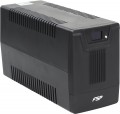Add to comparison |  |  |
|---|---|---|
| FSP DPV 1500 IEC 1500 VA | FSP DPV 1500 Schuko 1500 VA | |
| Outdated Product | from $143.99 up to $164.43 | |
| TOP sellers | ||
| Type | smart | smart |
| Form factor | standard (Tower) | standard (Tower) |
| Switching to battery | 6 ms | 6 ms |
Input | ||
| Input voltage | 1 phase (230V) | 1 phase (230V) |
| Input voltage range | 162-290 V | 162-290 V |
| Bypass (direct connection) | is absent | is absent |
Output | ||
| Output voltage | 1 phase (230V) | 1 phase (230V) |
| Peak output power | 1500 VA | 1500 VA |
| Rated output power | 900 W | 900 W |
| Output voltage accuracy | 10 % | 10 % |
| Output waveform | similar to a sinusoid (approximated) | similar to a sinusoid (approximated) |
| Output frequency | 50-60 Hz | 50-60 Hz |
| Redundant sockets | 4 | |
| Socket type | type F (Schuko) | |
| Reserved C13/C14 connectors | 6 | |
Battery | ||
| Total battery capacity | 9 Ah | 9 Ah |
| Number of batteries | 2 | 2 |
| Full charge time | 360 min | 360 min |
| Cold start | ||
Protection | ||
| Protection | short circuit protection overload protection noise filtering sound alarm | short circuit protection overload protection noise filtering sound alarm |
| Fuse | melting | melting |
| Control interfaces | USB | USB |
General | ||
| Screen | ||
| Operating temperature | 0 – 40 °C | 0 – 40 °C |
| Noise level | 40 dB | 40 dB |
| Dimensions (HxWxD) | 182x130x320 mm | 182x130x320 mm |
| Weight | 10.4 kg | 10.4 kg |
| Added to E-Catalog | october 2016 | october 2016 |